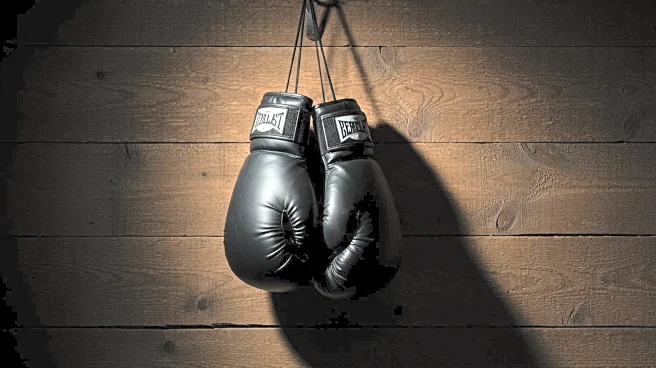What's Happening?
Julio César Chávez Jr., a prominent Mexican boxer, is set to stand trial in Mexico over allegations of cartel ties and arms trafficking. A judge in Hermosillo, Mexico, has allowed Chávez to await trial outside of detention, as confirmed by his lawyer, Rubén Fernando Benítez Alvarez. The court has granted an additional three months for further investigation into the case. Chávez, who has been living in the United States, was arrested in July for overstaying his visa and providing false information on a green card application. The arrest followed a boxing match with Jake Paul in Los Angeles. Mexican prosecutors have been investigating Chávez since 2019, following a U.S. complaint against the Sinaloa Cartel. The investigation has implicated 13 individuals, including Ovidio Guzmán López, son of Joaquín 'El Chapo' Guzmán. Chávez was deported to Mexico on August 19 and is currently in the custody of the Federal Attorney General’s Office.
Why It's Important?
This case highlights the ongoing pressure from the Trump administration on Mexico to address organized crime. The trial of a high-profile figure like Chávez underscores the broader efforts to combat cartel activities and the cross-border implications of such crimes. The case also reflects the complex legal and diplomatic interactions between the U.S. and Mexico, particularly concerning extradition and deportation. For the U.S., this trial could signify a step towards greater cooperation with Mexico in tackling organized crime. For Mexico, it represents a significant legal challenge and a test of its judicial system's ability to handle high-profile cases involving international crime syndicates.
What's Next?
As the trial progresses, it is expected that there will be increased scrutiny on the Mexican judicial process and its handling of cartel-related cases. The outcome of this trial could influence future U.S.-Mexico collaborations on crime and security. Additionally, the trial may impact Chávez's career and public image, given his previous legal troubles and struggles with addiction. Stakeholders, including law enforcement agencies and political leaders, will likely monitor the trial closely, as its implications could extend to broader policy and security measures in both countries.
Beyond the Headlines
The trial of Julio César Chávez Jr. also raises questions about the influence of organized crime in sports and entertainment. It highlights the potential vulnerabilities of public figures to criminal networks and the challenges in maintaining integrity within these industries. The case may prompt discussions on the need for stricter regulations and oversight to prevent similar situations in the future.









